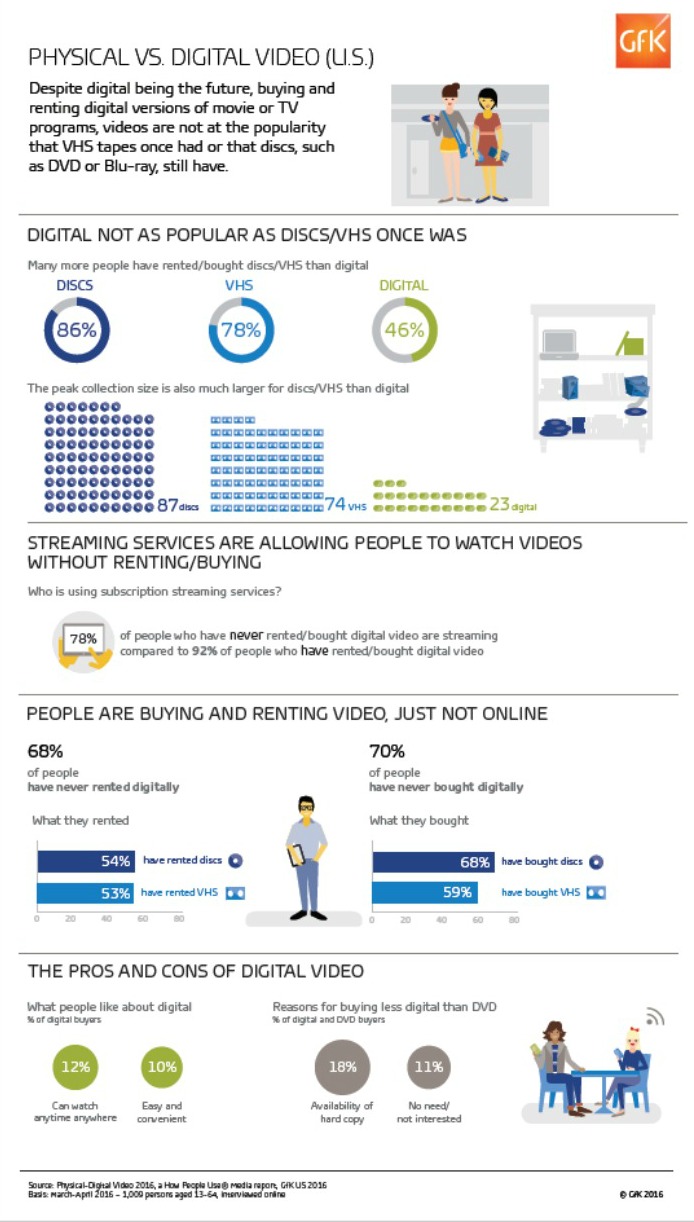 GfK announced its latest research suggests that, rather than purchasing digital copies of individual video titles, most consumers prefer watching them online or through subscription services.
GfK announced its latest research suggests that, rather than purchasing digital copies of individual video titles, most consumers prefer watching them online or through subscription services.
For more information visit: www.gfk.com
Unedited press release follows:
Buying, Renting Videos by Title Is Not Making the Leap to the Digital Marketplace
“All-access” subscription services have pushed aside spending on individual movies, programs – new GfK study
NEW YORK — As the sharing economy goes mainstream, consumers seem to be setting aside the ambition to be video collectors, with tangible libraries of their favorite movies and TV shows. With so much content now available at will via online and subscription video services, ownership and renting of individual titles has become surprisingly rare, according to a new study from GfK.
The report, offered as part of GfK’s The Home Technology Monitor™, shows that many consumers continue to prize their DVDs and other physical media, with their “Director’s Cuts,” audio commentaries, and other special features. But viewers are less likely to add to their video libraries with intangible digital copies, suggesting that content marketers need to be more proactive in understanding and reaching out to videophiles.
According to the study, less than half (46%) of consumers say they have ever purchased or rented a digital-only copy of a TV program or movie, compared with 86% who have ever bought or rented a DVD or Blu-ray disc, and 78% for VHS tapes. Among “digital-never” consumers – those who have never bought or rented a digital program or movie – 70% have bought or rented a DVD or Blu-ray disc, and 68% have done the same with a VHS tape.
In the study, at least two thirds of “digital nevers” mentioned the availability of an SVOD service as an important reason for not buying digital copies of individual titles. Key consumer concerns about digital-only formats include difficulty of use, inability to access all content across all devices, and need for an Internet connection to view.
Among those who do rent digital movies, 33% do so monthly, compared with a 60% frequency for those who rented VHS or disc movies in the past. Not only are consumers reporting fewer overall digital transactions, but also less frequency among those who are buying digital video.
“Our research clearly shows that most ‘digital-nevers’ have histories of renting or buying TV programs and movies in physical media,” said David Tice, SVP of Media and Entertainment and director of The Home Technology Monitor. “But the desire to seek out and purchase content so purposefully seems to have given way in a digital world to a subscription mindset. Content creators and distributors need to do a better job of translating viewers’ passions and curiosity into digital transactions at the title level – which brings a lot more direct revenue to the companies involved.”
The study also shows that, even though 37% of respondents had purchased DVD or Blu-ray discs that included access to a digital-only version of the video, two-thirds of these buyers have never activated the digital content – mostly because they have “no need” for it or are just “not interested.”
GfK’s report, “Physical versus Digital Video: A Tale of Three Media,” is based on interviews with 1,006 consumers on GfK’s KnowledgePanel®, which combines the capabilities of web-based interviewing with robust probability-based samples. The report covers the following (for digital titles, discs, and videotapes):
• frequency of renting and buying (when they were regularly using each medium)
• locations/services used for renting/purchasing
• video collection size
• replacement of one medium with another
• purchase of box sets
• use of kiosks for renting discs
• activation of digital versions included in disc purchases
• reasons and importance of SVOD among those never purchasing digital titles
• likes/dislikes about purchasing digital copies
The report also includes a qualitative snapshot via three online focus groups with 16 total respondents.
About GfK
GfK is the trusted source of relevant market and consumer information that enables its clients to make smarter decisions. More than 13,000 market research experts combine their passion with GfK’s long-standing data science experience. This allows GfK to deliver vital global insights matched with local market intelligence from more than 100 countries. By using innovative technologies and data sciences, GfK turns big data into smart data, enabling its clients to improve their competitive edge and enrich consumers’ experiences and choices.
For more information, please visit www.gfk.com or follow GfK on Twitter: https://twitter.com/GfK
